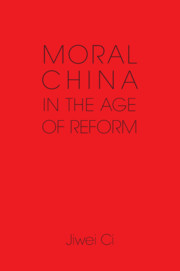Crossref Citations
This Book has been
cited by the following publications. This list is generated based on data provided by Crossref.
2015.
Books Received.
The China Quarterly,
Vol. 221,
Issue. ,
p.
290.
Sorace, Christian
2016.
Party Spirit Made Flesh: The Production of Legitimacy in the Aftermath of the 2008 Sichuan Earthquake.
The China Journal,
Vol. 76,
Issue. ,
p.
41.
Wang, Xiao-lei
2017.
Cultivating morality in Chinese families—Past, present, and future.
Journal of Moral Education,
Vol. 46,
Issue. 1,
p.
24.
Sun, Wanning
and
Lei, Wei
2017.
In Search of Intimacy in China: The Emergence of Advice Media for the Privatized Self.
Communication, Culture & Critique,
Vol. 10,
Issue. 1,
p.
20.
Forst, Rainer
2017.
Noumenal Alienation: Rousseau, Kant and Marx on the Dialectics of Self-Determination.
Kantian Review,
Vol. 22,
Issue. 4,
p.
523.
Bischoping, Katherine
and
Gao, Zhipeng
2017.
Story sequencing and stereotyping.
Narrative Inquiry,
Vol. 27,
Issue. 1,
p.
85.
Tong, Zhichao
2017.
The Law of Peoples as inclusive international justice.
Journal of International Political Theory,
Vol. 13,
Issue. 2,
p.
181.
Møllgaard, Eske J.
2018.
The Confucian Political Imagination.
p.
165.
Møllgaard, Eske J.
2018.
The Confucian Political Imagination.
p.
143.
Cody, Sacha
2018.
Borrowing from the Rural to Help the Urban: Organic Farming Exemplars in Postsocialist China.
The Asia Pacific Journal of Anthropology,
Vol. 19,
Issue. 1,
p.
72.
Møllgaard, Eske J.
2018.
The Confucian Political Imagination.
p.
1.
Cody, Sacha
2019.
Exemplary Agriculture.
p.
1.
Sun, Ivan Y
Wu, Yuning
Liu, Jianhong
and
Van Craen, Maarten
2019.
Institutional procedural justice and street procedural justice in Chinese policing: The mediating role of moral alignment.
Australian & New Zealand Journal of Criminology,
Vol. 52,
Issue. 2,
p.
272.
Merrifield, Caroline
2019.
Seeing and Knowing: Sourcing Safe Food in Zhejiang.
Journal of Current Chinese Affairs,
Vol. 48,
Issue. 3,
p.
281.
Crane, Sam
2019.
Prolegomenon to a Theory of Philosophical Transposition, with Reference to Confucianism in America.
Metaphilosophy,
Vol. 50,
Issue. 4,
p.
459.
Procyshyn, Alexei
and
Wenning, Mario
2019.
Recognition and Trust: Hegel and Confucius on the Normative Basis of Ethical Life.
Dao,
Vol. 18,
Issue. 1,
p.
1.
Sun, Guodong
2019.
The Introversive Political Meritocracy: A Political Possibility Beyond “The End of History”.
Fudan Journal of the Humanities and Social Sciences,
Vol. 12,
Issue. 4,
p.
569.
Knight, Adam
2020.
Law and the Party in China.
p.
237.
Sun, Wanning
2020.
Consumption Plus Love: Inequality, Domestic Utopia, and China’s New Politics of the Future.
Modern China,
Vol. 46,
Issue. 1,
p.
49.
Peng, Altman Yuzhu
Zhang, Ivy Shixin
Cummings, James
and
Zhang, Xiaoxiao
2020.
Boris Johnson in hospital: a Chinese gaze at Western democracies in the COVID-19 pandemic.
Media International Australia,
Vol. 177,
Issue. 1,
p.
76.





